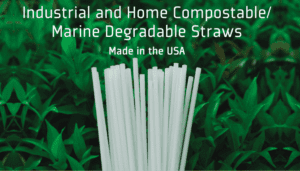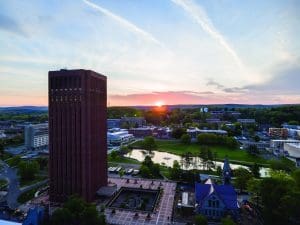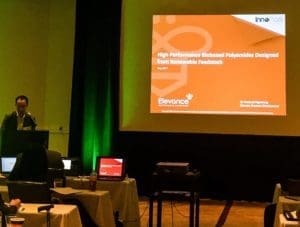Sip on This! American Manufacturer Releases Compostable Straw Line
UrthPact leading the way to a more sustainable future with its newest single-use product line.
 Leominster, MA, April 22, 2019, Nestled within a generation of consumers concerned for the future of our planet, UrthPact, a US manufacturer of compostable products that are typically produced using petroleum plastics, is pleased to announce its expansion to a new line of plant-based straws. Already a worldwide industry leader in compostable coffee pods, one-way degassing valves, cutlery and bottles and caps, UrthPact is once again flipping the single-use product world upside down with its continued innovation and earth-friendly objectives.
Leominster, MA, April 22, 2019, Nestled within a generation of consumers concerned for the future of our planet, UrthPact, a US manufacturer of compostable products that are typically produced using petroleum plastics, is pleased to announce its expansion to a new line of plant-based straws. Already a worldwide industry leader in compostable coffee pods, one-way degassing valves, cutlery and bottles and caps, UrthPact is once again flipping the single-use product world upside down with its continued innovation and earth-friendly objectives.
Produced in the US at both their East and West Coast facilities, the first in a two-product line-up includes Industrial Compostable straws, which are available now. The second-tier of the line, slated to hit the market in January of 2020, raises the environmental standards even higher with a Home Compostable/Marine Degradable option.
When given the choice between comparable products that are either compostable or will sit on the earth for hundreds of years, most people will choose the sustainable option. The problem with many of the items developed recently, is that they do not function as well as their petroleum-based counterparts. This sub-par performance has particularly been the case with the sustainable straws produced to-date.
Paul Boudreau, CEO of UrthPact explains, “We realized that people are unhappy with today’s alternative for earth-friendly straws,” which is why the company decided there was a need to produce an upgraded version. “Our straws function like traditional plastic straws, but are safer for the environment,” he continued. Boudreau hopes that with this new alternative more businesses will be willing to switch to this sustainable option, eliminating customer complaints and creating an all-around win for the corporate, consumer and natural worlds.
With all-of-the-above to consider, why not just eliminate straws all-together? “Perhaps someday straws will be a thing of the past, but for now they are so embedded into our culture, businesses will continue to use them. At least now we have a better option to offer,” said Boudreau. He also noted the need to respect the many members of our ADA (Americans with Disabilities) community who rely on the use of straws to help with everyday functionality.
A History Lesson… Not the First, But the Best Bet
UrthPact’s East Coast plant is located in Leominster, Massachusetts, known as the Pioneer Plastics City for claiming the invention of the plastics industry we know today. Now with UrthPact’s growing presence, a new sustainable revolution is taking place. “What began ten years ago with the development of a compostable golf tee is exploding in all directions,” notes Boudreau. “People want to see more earth-friendly options and we have the ability to create and supply those items.” UrthPact also manufactures out of Lincoln, California, creating a coast-to-coast catalogue of product availability.
Boudreau recognizes UrthPact is not the first to tackle compostable straws but explains the benefits of using a US-based company, “Straws and other items manufactured overseas may not have the same quality standards that we have in the US.” UrthPact’s compostable items are produced in its SQF (Safe Quality Food) certified plants, guaranteeing safety.
Additionally, the shipping requirements to import products from overseas only increase their total carbon footprint. “That’s like solving one problem but creating another,” remarked Boudreau. “Being able to manufacture on both sides of the country allows for fast and easy shipping to all locations within North America without the added stress on the environment.”
Next Big Dive for UrthPact… Into the Ocean
UrthPact has been going green for years but is now shifting its attention to going blue. Despite clean-up efforts throughout our oceans, petroleum-based plastics, unless eliminated, will continue to haunt our waterways and the ocean life that inhabit it. “It’s one thing to save the land we stand on,” pushed Boudreau, “but our planet is far more blue than green. It’s time to clean up our act in the oceans.”
Which is why coming in January of 2020, UrthPact aims even higher with its first shipments of Home Compostable (AS-5800) and Marine Degradable (ASTM-D6691) straws. Compared with Industrial Compostable straws (ASTM-D6400), which require specialized facilities to fully break down, this version will rapidly return to nutrient-rich soil in a home garden composter or biodegrade in a marine environment. “Should these straws make it into the ocean, they will completely biodegrade, taking us one step closer to cleaner oceans,” declares Boudreau.
Boudreau is sharing the results to the independent lab testing work they have done and is looking to work with marine biologists throughout this process. “We will only make claims that are supported by science and are accepted by the people out there who care the most for our oceans,” Boudreau states. “We may not have the final solution to this big problem just yet,” he exclaimed, “but while we work towards that, we believe we have created something that will stop the damage being done right now.”
Taking Orders Now
UrthPact’s Industrial Compostable straws are now available for purchase. Customers can also pre-order home compostable/marine degradable straws for delivery in January 2020, but quantities will be limited. Those currently ordering Industrial Compostable straws will have first access to their home/marine line.
For more information on the above or UrthPact’s other endeavors, please visit: www.urthpact.com or contact Lauren MacKay at 978-847-9747 or lmackay@urthpact.com
“UrthPact helps brands create products and packaging from earth-friendly materials, protecting a world that needs it and championing a generation of consumers that demand it.”
Read the original press release here.


 We got a chance to connect with UrthPact’s own VP of Technology, Derek Helmer, and VP of Operations, Mike Pousland, about their recent trip to Newark, NJ for the
We got a chance to connect with UrthPact’s own VP of Technology, Derek Helmer, and VP of Operations, Mike Pousland, about their recent trip to Newark, NJ for the  UrthPact is a proud sponsor of this year’s
UrthPact is a proud sponsor of this year’s